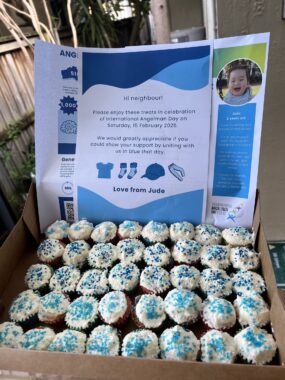How we’ll be raising awareness on International Angelman Day
Wearing blue is one of many ways to support Angelman families on Feb. 15
Written by |

As a caregiver, I understand that raising awareness about Angelman syndrome requires us to proactively educate the public. This can be done via social media or by organizing and participating in advocacy events. No gesture is too small.

We’re encouraging our community to show support on International Angelman Day by wearing blue. (Photo by Joelene Wand)
This year, on Feb. 15, my family will participate in our first International Angelman Day, an annual celebration to raise awareness, promote research and educational resources, mobilize people to action, encourage fundraising, and honor those who are no longer with us.
The color blue represents and unifies Angelman patients, caregivers, family members, and supporters.
Ursula Christel, an artist and advocate for greater inclusion from New Zealand, whose son Andrew lives with Angelman syndrome, established International Angelman Day together with Angelman Syndrome Ireland co-founder Sarah Roarty, whose daughter Clara has the disease. Christel explained to me that the selection of the color blue evolved organically, and it symbolizes the sky, the heavens, angels, and beauty. She noted that people with Angelman syndrome also have an affinity for water, so blue is a great match.
Our family plans to distribute flyers explaining Angelman syndrome and how our young son Jude can best be supported in the community. We’re also making blue cupcakes and cookies to hand out at our workplaces, at Jude’s swimming school, and to his therapists and our neighbors. We’ll also attend an International Angelman Day event in our state and host a picnic with friends, where we’ll encourage everyone to show their support by wearing blue.
The global registry and building courage to speak out
When I spoke with Christel, she encouraged caregivers to sign up at the Global Angelman Syndrome Registry, which collects data on symptoms, medications, and developmental trajectories. The registry is important for research, lobbying, and advocacy.
Contributing to it is a meaningful way for caregivers to have a direct impact and raise awareness on behalf of their loved ones. Contributions help to build a comprehensive database and assist researchers in better understanding the disease. Participating is easy, and caregivers can contribute in a manner that best fits their schedule.
In our family’s case, knowing when to speak up or what to say when people are confronted with Jude’s condition is challenging. For example, a kind stranger might say to Jude, “Not talkative today, are we?” Do I tell them that Jude is nonverbal? Also, what’s the best way to respond to people who stare at Jude in public? And what do I say to someone who’s uncomfortable with the topic of disability or even with Jude because they don’t know what to say or don’t want to upset us?
In the lead-up to International Angelman Day, I read Emily Ladau’s book, “Demystifying Disability: What to Know, What to Say, and How to be an Ally.” Ladau, a disability rights activist who has Larsen syndrome, shared that if those in the disability community want a world that is accessible to them, then they must make ideas about disability accessible to the world.
Acknowledging that, for the most part, uncomfortable stares and silence stem from a lack of understanding of Angelman syndrome, and disability in general, is an important first step. How we choose to respond matters, and I’m choosing to respond to awkward conversations with kindness and by using them as an opportunity to explain what makes Jude so unique.
Raising awareness is about more than just sharing information. It involves creating a community that provides support, understanding, and hope. Every story that’s told and every voice that’s raised brings us closer to a brighter future for our loved ones living with Angelman syndrome.
Note: Angelman Syndrome News is strictly a news and information website about the disease. It does not provide medical advice, diagnosis, or treatment. This content is not intended to be a substitute for professional medical advice, diagnosis, or treatment. Always seek the advice of your physician or other qualified health provider with any questions you may have regarding a medical condition. Never disregard professional medical advice or delay in seeking it because of something you have read on this website. The opinions expressed in this column are not those of Angelman Syndrome News or its parent company, Bionews, and are intended to spark discussion about issues pertaining to Angelman syndrome.






Leave a comment
Fill in the required fields to post. Your email address will not be published.